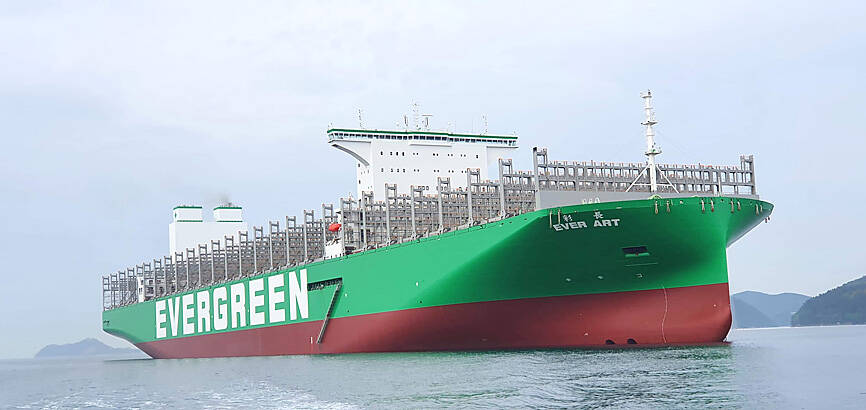Evergreen Marine Corp (長榮海運) and Yang Ming Marine Transport Corp (陽明海運) this year granted substantially large year-end bonuses to employees given strong profits, despite a decline in shipping rates this quarter.
Evergreen Marine, the nation’s largest container shipping company, distributed year-end bonuses of as much as 52 months wages to some of its employees yesterday, higher than the 40 months it offered last year, the Chinese-language Liberty Times (sister newspaper of the Taipei Times), reported yesterday.
Most employees were rewarded with year-end bonuses ranging from 10 to 45 months of wages, while those demonstrating superior job performances received the equivalent of 52 months of salary, the report said.

Photo courtesy of Evergreen Marine Corp
Evergreen declined to confirm the report or answer questions about the bonuses. It only said that each employee was compensated based on their performance.
Evergreen reported a net profit of NT$304.35 billion (US$9.91 billion) during the first three quarters of the year, up 92 percent year-on-year, or earning per share of NT$68.88, corporate data showed.
Evergreen’s local rival, Yang Ming Marine, planned to reward its employees with up to 13 months of their monthly salary, the Liberty Times reported yesterday.
The shipper’s net profit surged 51 percent year-on-year to NT$165.85 billion in the first three quarters of the year.
The company’s earnings per share were NT$46.97, up from NT$32.42 a year earlier, corporate data showed.
The shipping companies said that the significant revenue growth was a result of rising freight rates amid labor shortages and congestion at ports around the world amid the COVID-19 pandemic.
Evergreen shares gained 1.88 percent to NT$163, while Yang Ming shares rose 1.08 percent to NT$65.5 in Taipei trading yesterday.

MULTIFACETED: A task force has analyzed possible scenarios and created responses to assist domestic industries in dealing with US tariffs, the economics minister said The Executive Yuan is tomorrow to announce countermeasures to US President Donald Trump’s planned reciprocal tariffs, although the details of the plan would not be made public until Monday next week, Minister of Economic Affairs J.W. Kuo (郭智輝) said yesterday. The Cabinet established an economic and trade task force in November last year to deal with US trade and tariff related issues, Kuo told reporters outside the legislature in Taipei. The task force has been analyzing and evaluating all kinds of scenarios to identify suitable responses and determine how best to assist domestic industries in managing the effects of Trump’s tariffs, he

TIGHT-LIPPED: UMC said it had no merger plans at the moment, after Nikkei Asia reported that the firm and GlobalFoundries were considering restarting merger talks United Microelectronics Corp (UMC, 聯電), the world’s No. 4 contract chipmaker, yesterday launched a new US$5 billion 12-inch chip factory in Singapore as part of its latest effort to diversify its manufacturing footprint amid growing geopolitical risks. The new factory, adjacent to UMC’s existing Singapore fab in the Pasir Res Wafer Fab Park, is scheduled to enter volume production next year, utilizing mature 22-nanometer and 28-nanometer process technologies, UMC said in a statement. The company plans to invest US$5 billion during the first phase of the new fab, which would have an installed capacity of 30,000 12-inch wafers per month, it said. The

Taiwan’s official purchasing managers’ index (PMI) last month rose 0.2 percentage points to 54.2, in a second consecutive month of expansion, thanks to front-loading demand intended to avoid potential US tariff hikes, the Chung-Hua Institution for Economic Research (CIER, 中華經濟研究院) said yesterday. While short-term demand appeared robust, uncertainties rose due to US President Donald Trump’s unpredictable trade policy, CIER president Lien Hsien-ming (連賢明) told a news conference in Taipei. Taiwan’s economy this year would be characterized by high-level fluctuations and the volatility would be wilder than most expect, Lien said Demand for electronics, particularly semiconductors, continues to benefit from US technology giants’ effort

‘SWASTICAR’: Tesla CEO Elon Musk’s close association with Donald Trump has prompted opponents to brand him a ‘Nazi’ and resulted in a dramatic drop in sales Demonstrators descended on Tesla Inc dealerships across the US, and in Europe and Canada on Saturday to protest company chief Elon Musk, who has amassed extraordinary power as a top adviser to US President Donald Trump. Waving signs with messages such as “Musk is stealing our money” and “Reclaim our country,” the protests largely took place peacefully following fiery episodes of vandalism on Tesla vehicles, dealerships and other facilities in recent weeks that US officials have denounced as terrorism. Hundreds rallied on Saturday outside the Tesla dealership in Manhattan. Some blasted Musk, the world’s richest man, while others demanded the shuttering of his